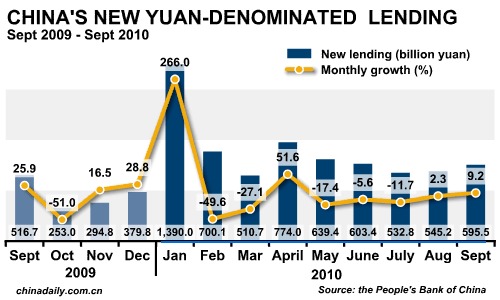BEIJING - China saw large increases in both new lending and foreign exchange reserves last month, triggering more concerns over rising inflationary pressures and "hot money" inflows, the country's central bank said in Beijing on Wednesday.
New yuan-denominated lending in September rose to 595.5 billion yuan ($89.28 billion), an increase of 9.2 percent from August, the People's Bank of China (PBOC), the central bank, said in a statement on its website.

China's banks extended 6.3 trillion yuan from January to September, 2.36 trillion yuan, or 27.3 percent, less than the same period in 2009, it said.
Yuan loans outstanding at the end of September totaled 46.28 trillion yuan, 18.5 percent higher than a year earlier, said the statement.
Annual growth in the broad M2 measure of money supply, including cash in circulation and all deposits, was 19 percent in September, compared with 19.2 percent last month.
The country's narrow M1 measure of money supply, which covers cash in circulation plus current corporate deposits, increased by 20.9 percent in September year on year, one percentage point and 11.5 percentage points lower than that of this August and the end of last year.
Zhao Qingming, a senior researcher with China Construction Bank, said the expansion in new loans last month was "a little bit beyond the regulators' expectation," which also explained the central bank's recent move on liquidity control.
The PBOC on Tuesday temporarily raised the reserve requirement ratio of its four major state-owned lenders and two privately-owned banks, China Merchants Bank Co and Minsheng Banking Corp, by an extra 50 basis points, or 0.5 percentage points, in reserves.
It is the fourth time this year the reserve ratio for the six banks has been raised to rein in lending and combat inflation, lifting the four state-run banks' reserve ratio to 17.5 percent.
The Chinese government set the annual target for new loans of 2010 at 7.5 trillion yuan at the beginning of the year, after a record 9.59 trillion yuan of new lending in 2009 fueled asset bubbles and inflation fears.
Based on the latest loan figures, up to 84 percent of the planned annual lending was pumped into market in the first nine months of this year.
The Chinese government has been well aware of the inflationary pressures, with the country's July CPI up 3.3 percent year on year and expanding 3.5 percent from a year earlier in August, according to the National Bureau of Statistics. The September figure is yet to be issued.
New lending for the whole year is not likely to go much beyond the 7.5-trillion-yuan target, said Zhao.
Foreign exchange reserves soar
China's foreign exchange reserves totaled $2.6483 trillion by the end of September, up 16.5 percent year on year, the central bank said.
The added amount in the third quarter alone reached $194 billion in the third quarter, a big rise compared to the $47.9 billion increase in the first quarter and only $7.2 billion in the second quarter.
Experts attributed the sharp build-up of forex mainly to the increasing inflow of "hot money" on outlook of a stronger yuan.
Guo Tianyong, head of the China Banking Research Center at the Central University of Finance and Economics, said that the international tensions over exchange rates boosted demand for yuan as a safe haven asset, especially after the central bank pledged more flexibility of the yuan.
The expectation of a stronger yuan and the sound economic development accelerated the inflow of foreign capital, he added.
China set the central parity rate of the yuan at 6.6693 per US dollar on Wednesday, driving its value to a new high against U.S. dollar, according to the data released by the China Foreign Exchange Trading System.
The value of the yuan rose against the US dollar by about 1.74 percent in September, the biggest monthly gain since the July 2005 revaluation.
Based on Wednesday's central parity, the yuan had gained 2.32 percent from the rate of 6.8275 per US dollar that was set a day before the PBOC's pledge to increase flexibility on June 19.
China's foreign exchange regulator, the State Administration of Foreign Exchange on Tuesday warned of "hot money inflows" in the second half of this year and beyond as investors bring money into China to benefit from higher interests rates and expected yuan appreciation.
The regulator said it would continue to stop inflows of "hot money" into China and crackdown on illegal foreign exchange activities.

